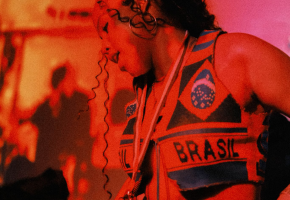Standing at a diminutive 5ft.6 (but 6ft if you count his afro) Tim Maia was a larger than life character, with the voice of an angel and the heart of a lion, who exploded like a hand grenade into the up-till-then elegant Brazilian music scene of the early 1970s.
While pop masters Elis Regina, Os Mutantes, Tom Zé and Jorge Ben were entertaining the masses and Tropicalist poets Caetano Veloso, Gilberto Gil, Milton Nascimento and Chico Buarque were inspiring students with avant-garde poetry, Tim Maia was like a “massive cannonball diving into the pool. It was the only dive Tim knew - large, in charge and completely out of control.”
A Multi-instrument - flute, vocals, drums and guitar - during his early teens, Maia left home with allegedly $12 in his pocket and no knowledge of English. Somehow he found himself on a plane to New York in 1959 when he was 17, telling U.S. immigration officials his name was ‘Jimmy’ and that he was a student. Living with distant cousins in Tarrytown, New York, he worked odd jobs, committed petty crimes, smoked weed and listened to soul music.
Maia, or 'Jimmy', quickly learned to speak, sing and write songs in English and formed a group called The Ideals. However, his hopes of making it in the Big Apple were soon dashed when he was arrested in 1963 for smoking marijuana in a stolen car, leading him to being swiftly deported back to Brazil.
Not surprisingly, once back in Rio, he was completely out of step with the prevailing mode of MPB and Tropicalia. But fortune favours the brave and, no doubt in Maia's case, also talent, charm and charisma. Tim got his break when singer Elis Regina fell in love with his song “These Are the Songs” and invited him to sing a duet of it with her in Portuguese and English on her 1970 album “Em Pleno Verño.” This high profile debut forced people to take notice of the unknown singer-songwriter with a big voice, bigger afro and huge ambitions.
As a result Maia was signed to Philips and released his first album in 1971. It was a huge hit, spending 24 weeks on the charts, beginning a new chapter in Brazilian music. His close friend, Nelson Motta, the A & R rep who signed Tim to the Philips label, remembers Tim’s initial impact on the scene:
“He was something absolutely new. Until then, Brazilian music was divided into nationalist MPB Tropicalia and international rock. All really white and really English. Tim Maia changed the game, introducing modern black music from the U.S. to national pop music, linking funk and baiño, bringing soul closer to bossa nova and opening windows and doors to new forms of music that were not Tropicalist, nor MPB, nor rock n’ roll: they were quintessentially Brazilian. They were Tim Maia.”
Tim wasn’t the first Brazilian artist under the sway of North American black music: Wilson Simonal and Jorge Ben experimented and synthesized different soul and funk rhythms into their styles, but Tim was the first to bring full throttle funk and...well, it was the way he did it: he asserted his black identity with confidence and power, not by being political, but just by being unashamedly black. His music and charisma helped to build the Black Rio movement, a new Afro-Brazilian music culture influenced by the U.S. civil rights struggle.
He was funny, smart and he was a hit machine. While others were spouting poetry and politics, Tim was unashamedly saying: ”Fuck politics! Let’s make love and party!’ His music would get everyone dancing like crazy, and then, when he downed the lights, crooned his ballads, he inspired hot romance and lots of sex, like a tropical Barry White. His kept on writing and recording songs in English, which helped pricked the ears of his US counterparts, but in Brazil he had so many huge hits in Portuguese, Brazilians didn’t take much notice of the songs in English.
According to reports, Maia had an enormous drug habit, which didn't diminish as he became famous. In 1971, fresh from the big hit of his first album, Tim went to London, smoked, inhaled, drank, traveled on acid and returned to Brazil with 200 doses of LSD to distribute amongst his friends, most notoriously going around the the offices off Philips offering most “square,” like the accounting and legal departments, with his offerings saying:
“This here is LSD, which will open your mind, improve your life, and make you a better and happier person. It’s very simple: there are no side effects. It is not addictive and only does good. You take it like this . . . ”
He would place the acid in his mouth, swallow it and leave another at the front desk. Since he was one of the best-selling artists for the company, everyone thought it humorous. In the production and journalism departments, the gifts were a success. Even Andre Midani, the president of the company, received his.
However, in 1974, Maia had somewhat of a conversion, throwing himself into a religious group called Cultura Racional that held the belief that humans are really aliens that need to reconnect with an elemental form of energy through the teachings of a book called Universo Em Desencanto. He quit drugs and would say things like “Pot and booze are the devil’s stuff.” - to the incredulity of fans those who’d been enjoying getting high with him a few months earlier.
All new songs on his two new devotional albums Tim Maia Racional I (1974) and II (1975) would be in celebration of his new faith in the Superior Rational from outer space. Philips had no interest in these bizarre and uncommercial songs, but that did not stop Tim Maia. Always a pioneer, he started the first independent music label in Brazil, called Seroma, and arranged for the albums to be produced and distributed by his company.
Having given up smoking and drinking, he lost a lot of weight and his voice had never been so clean and strong. His singing on the Racional albums is unrivaled, but to most the lyrics didn’t make any sense. Radio refused to play the Racional albums, which were mostly purchased by fellow cult members.
He left the sect one year later, broke, disillusioned and fed up with the hypocrisy of the cult leader. He ordered the destruction of all the Racional recordings and forbade anyone to record the songs. As someone who prided himself on being street smart and prison wise, Tim may have felt a bit ashamed of having been duped by a charlatan in a white robe preaching about UFO’s.
On his first post-Racional album Tim Maia 1976, Tim made sure to include a couple of ‘answer’ songs, possibly to assure fans that he was no longer under the sway of extra-terrestrials. Leaving Racional ism behind, Tim once again embraced the earthy reality of life. In “Nobody Can Live Forever,” he confronts human loneliness (“Nobody will know how I feel”) alongside the absence of God (“There’s no heaven / there’s no god / there’s no devil / there’s no hell), and concludes with existential resolve. “Play your music,” he chants.
As his career carried on through the 70s, 80s and 90s Tim became more like the folkloric characters he liked to sing about – the malandros – someone you had to be careful about trusting. He was famous for not showing up at his own shows and for sometimes appearing so drunk that he was not able to perform. When he did show up, he would terrorize the sound guy with demands for “More Bass! More Treble! More Volume! More EVERYTHING!”
Maia died on March 15, 1998, at the age of 55. Four months before his death, at his own cost, he played a chaotic show at a hotel lounge in Miami attended by 50 Brazilians. He then filmed a fabulous road trip from Miami to New York, visiting all the places he’d been to 40 years earlier, talking to people along the way. It was a like a wrap-up of his unfinished history.
“I am bicão,” he used to say about himself, which is slang for people who go to a party without an invitation. He may have crashed the party, but he never failed to warm it back to new levels of fun and decadence.
This article was inspired by the notes from Luakabop’s album 'Nobody Can Live Forever: The Existential Soul of Tim Maia' a collection of songs that spans Maia's 1970s recordings. More here https://www.luakabop.com/artists/tim-maia


















